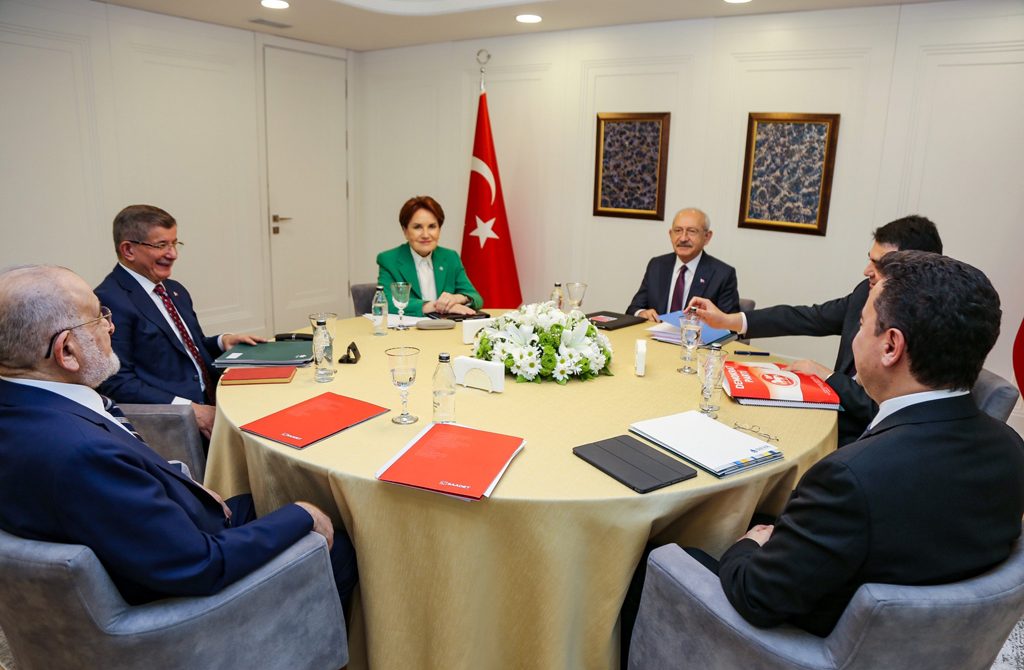The Turkish opposition bloc, popularly known as the “table for six,” held its 10th meeting and finally found an “easy way out” of a challenging situation. They came up with a “solution” that would make it easier for them to pick a presidential candidate.
Since we could not agree on whom to endorse, they said, let us all run for president!
Ahmet Davutoğlu, the chairperson of the Future Party (GP), unveiled the formula to the Turkish people: “Whether the president comes from within (the opposition bloc) or outside, the chairpersons will directly participate in decision-making processes with authority to sign documents. They will have as much authority over each strategic decision as the president – just like a president.”
In other words, Türkiye will have no less than six presidents in case of an opposition victory. If the opposition bloc endorses a presidential candidate, who does not currently chair one of the six parties, the number of presidents will reach seven. Indeed, if the country were to elect a president in the second round, there would have to be a “president” from the Peoples’ Democratic Party (HDP), increasing the number of presidents to eight.
Jokes aside, the formula Davutoğlu unveiled is no less problematic than the “coordination council,” an advisory body that the Felicity Party’s (SP) chairperson, Temel Karamollaoğlu, had brought up publicly a few months earlier.
To sum up, this “solution” represents an unprecedented type of coalition Alla Turca. Its sole purpose is to allow each party leader to tell their supporters that they will have power. It also ensures that the elected President will adhere to the policies of their party and the other coalition partners.
The questions
The question is whether this model, which critics will portray as teaching, is functional and in line with the nature of politics. I believe that this model is dysfunctional and unsuitable. First, the idea of a popularly elected president sharing their constitutional authority with several “president-like” party leaders would be a severe problem.
Let us assume that the elected president was to allocate their powers to multiple party leaders, whom they asked to serve as vice presidents. Even then, they could not respond to the charge of “tutelage over a popularly elected president,” “the president being reduced to a secretary” or “fueling chaos.” This “magical” formula raises many additional questions:
– How could six or seven politicians share power and exercise similar amounts of authority?
– Who shall serve as an umpire amid power struggles among them?
– Which issues will be treated as “strategic” – foreign policy, national security or the economy?
– If one of the party leaders were to veto a decision, would that not create a deadlock in critical areas?
– Who will pay the price for a “strategic” decision being delayed due to one of the party leaders vetoing that decision?
– How likely are the leaders of the main opposition Republican People’s Party (CHP), the Good Party (IP) and others to agree on deploying troops to Syria, Iraq and Libya?
– How will the coalition partners agree on mixed versus liberal economic policy?
– Last but not least, how does the coalition intend to manage any situation where six or seven individuals with “president-like” powers cannot reach a joint decision for crisis management?
Opposition’s formula
In a nutshell, the opposition bloc’s formula reflects a theoretical perspective that disregards practical realities. It rests in “liberal” assumptions incompatible with the nature of politics.
Regardless of who becomes president, they will have plenty of opportunities and excuses to undermine the relevant politicians. If the opposition bloc developed the formula, which Davutoğlu unveiled, after 10 meetings, they would probably make public their vice presidential picks together with their presidential candidate.
President Recep Tayyip Erdoğan has enough experience to tackle the opposition bloc’s presidential candidate and the party leaders that endorse them. For the record, to claim that “we are making history as different political movements and leaders, who gathered in the name of liberty, by agreeing on a new social contract” would only legitimize some political party’s decision to ride the CHP’s coattails. Of course, they could keep telling themselves that they, too, will be president for a while.
In this article
- Opinion
- 14 May 2023 Turkish General Election
- 2023 Turkish General Elections Presidential Candidates
- 2023 Turkish Presidential Election
- Daily Sabah
- Iraq
- Table for Six | Turkish Opposition Alliance
- Turkish Opposition
- Turkish President
- Türkiye
- Türkiye's 2023 Elections
- Türkiye's Democracy and Progress Party (DEVA)
- Türkiye's Future Party (GP)
- Türkiye's Peoples' Democratic Party (HDP)



